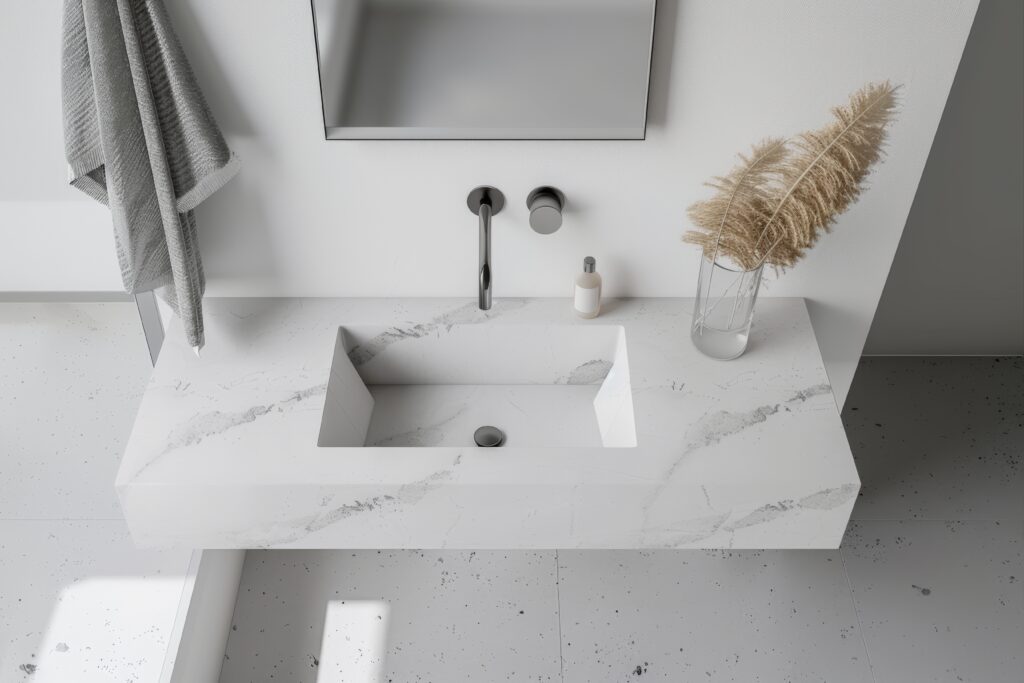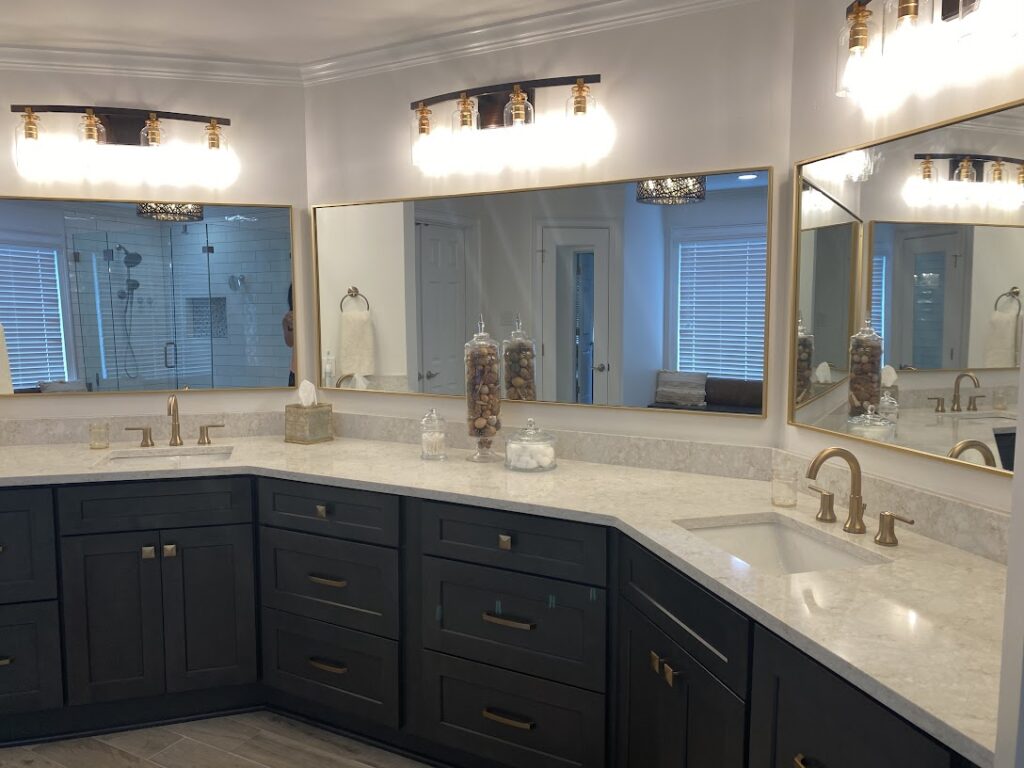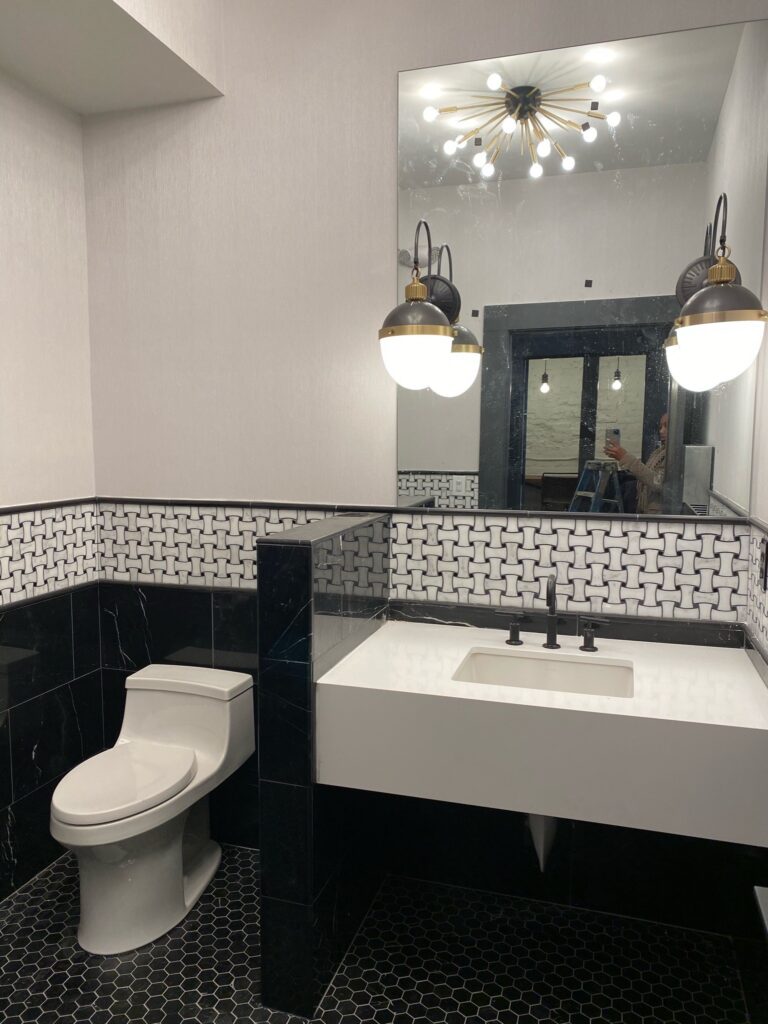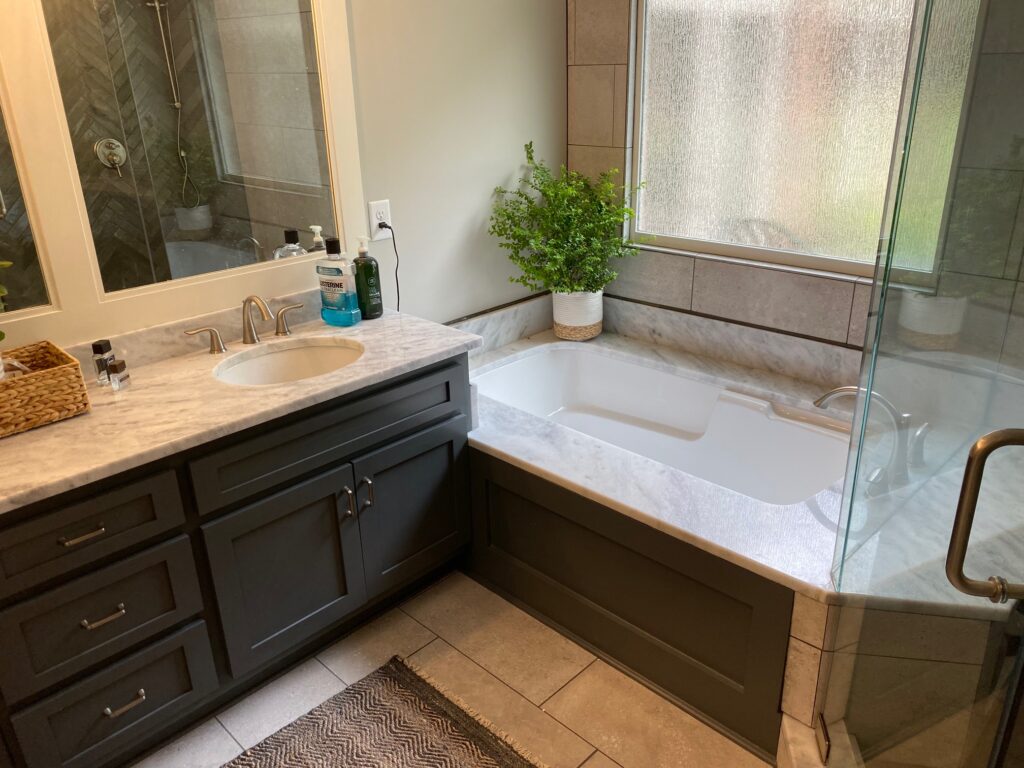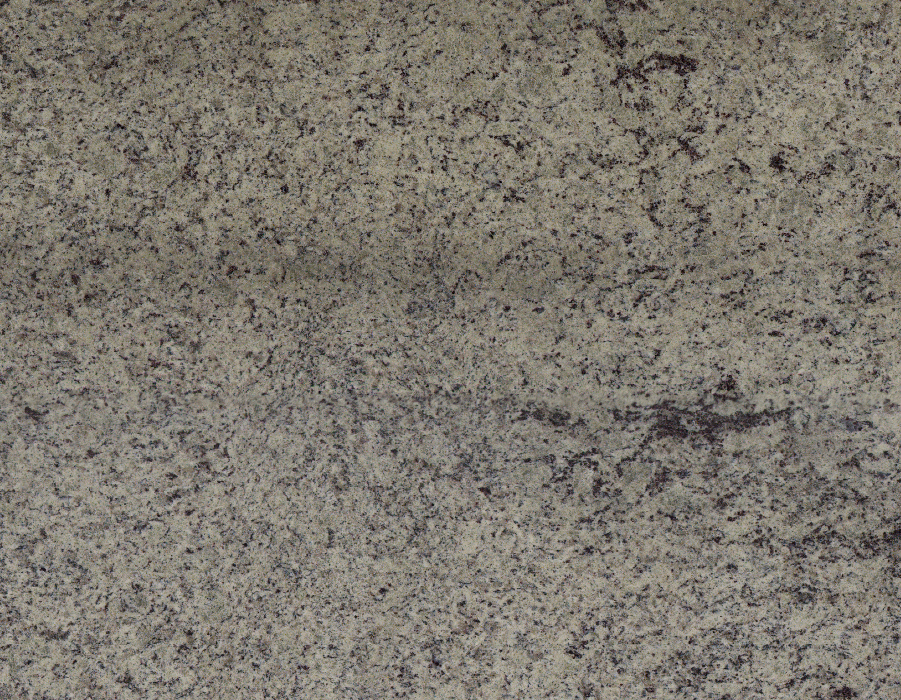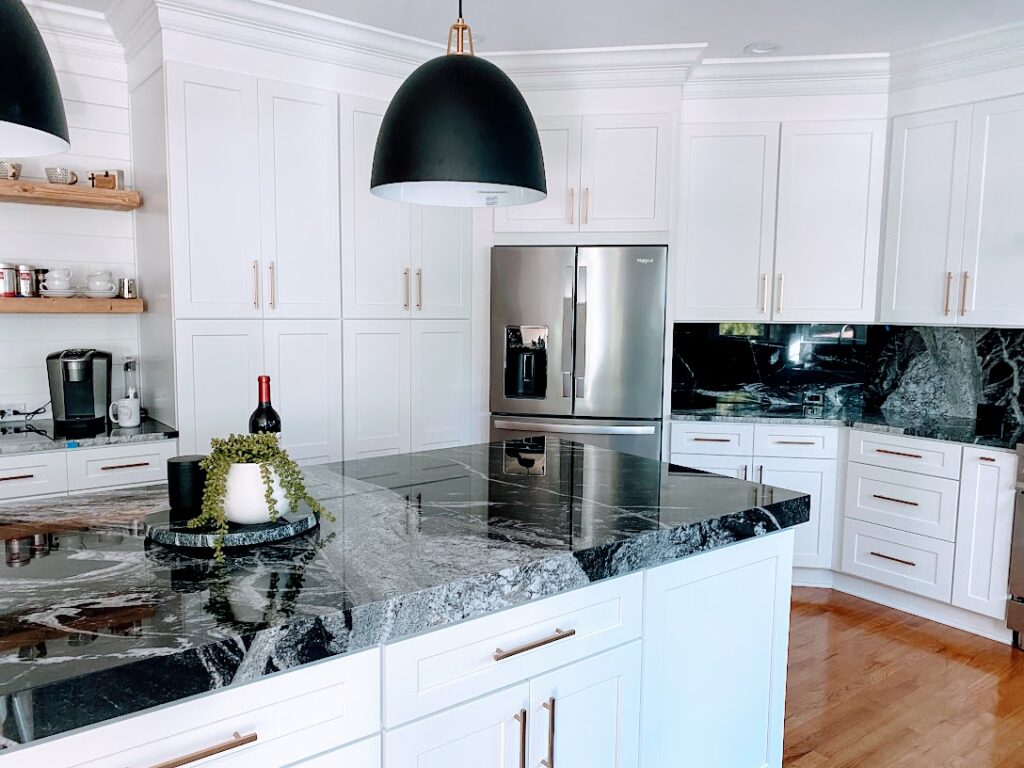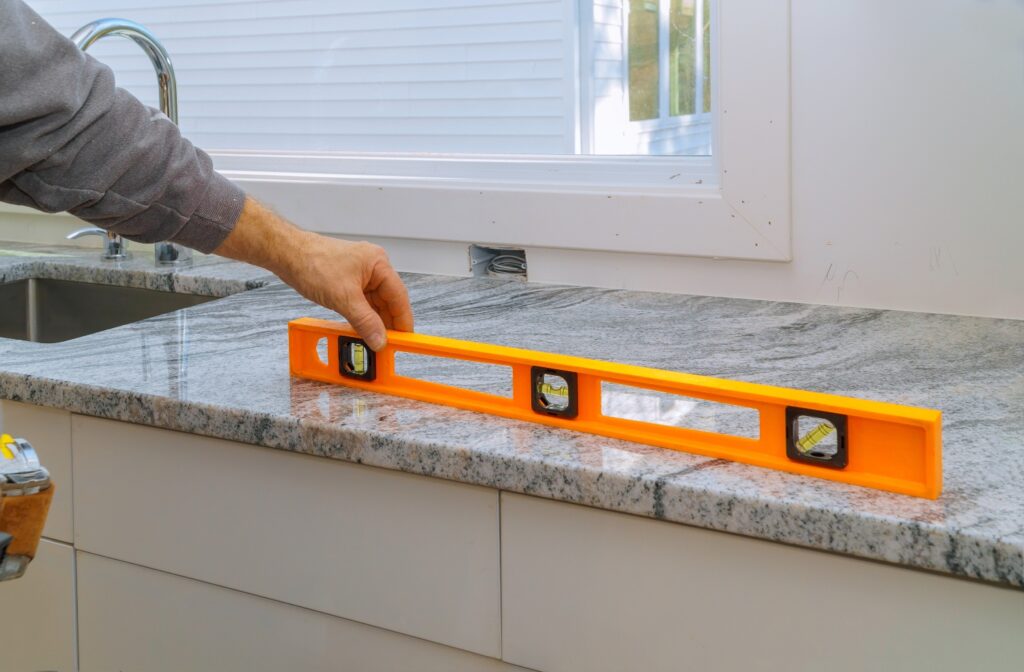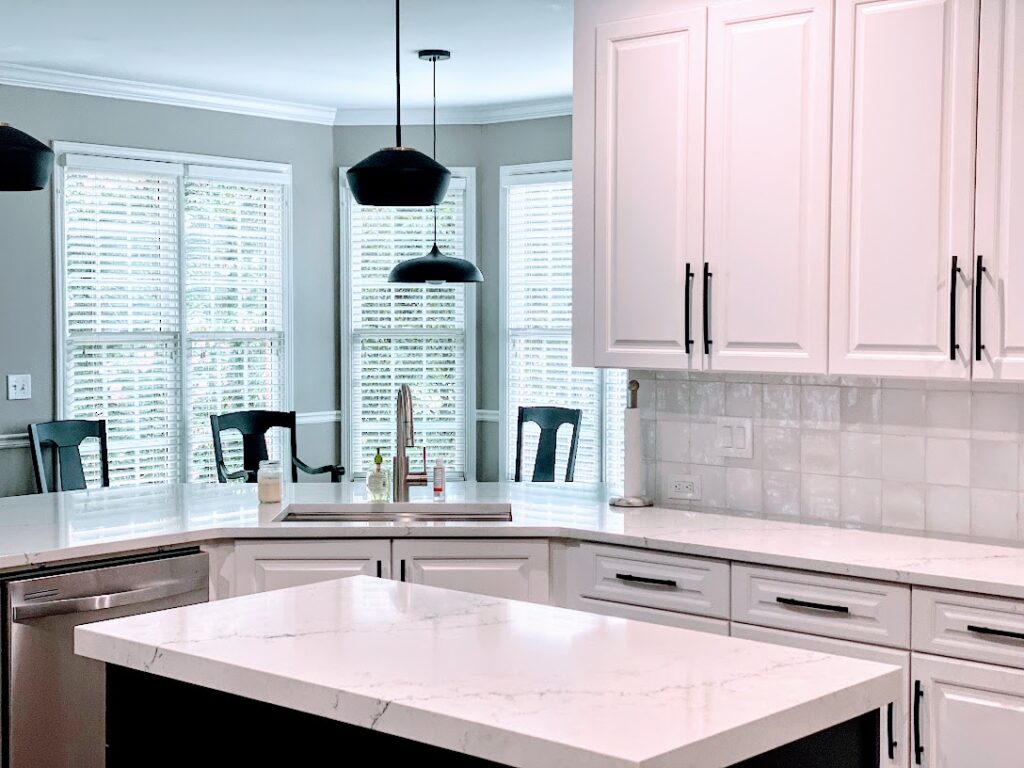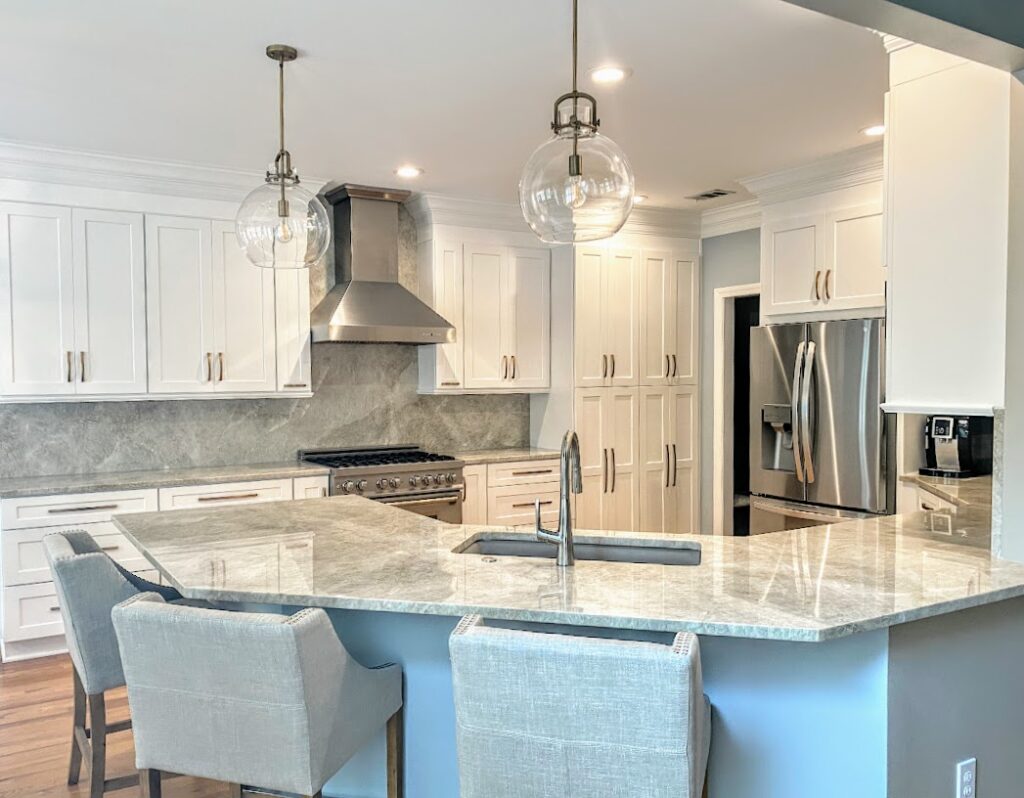Granite Countertops Vs. Glass Countertops
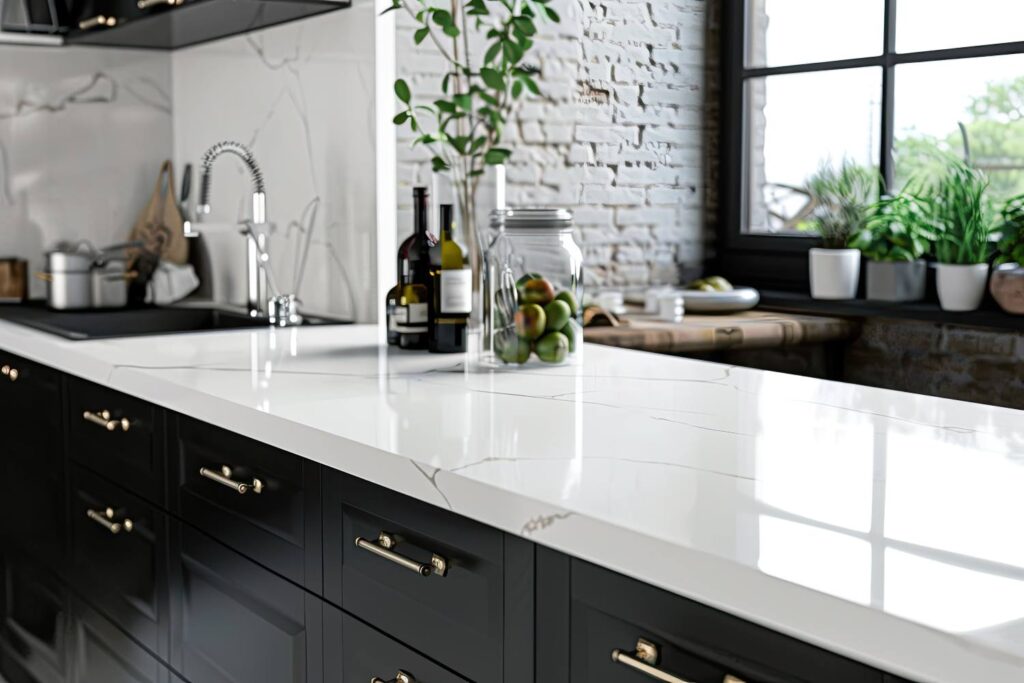
You’re faced with deciding whether to go for granite or glass countertops, and it’s not as straightforward as it seems. Granite boasts durability and timeless appeal, while glass offers a sleek, modern edge. But what about the practical aspects you might overlook? Granite’s maintenance demands can be daunting, but can glass withstand daily kitchen chaos without showing wear? There’s more than just aesthetics at play here; understanding these materials’ strengths and weaknesses will guide you toward the perfect choice for your home. Which one truly fits your lifestyle? Let’s explore further.
Aspect | Granite Countertops | Glass Countertops |
Durability | Highly durable, heat-resistant, scratch-resistant | Tempered but prone to chipping and scratching |
Maintenance | Requires regular sealing to prevent stains | Easy maintenance, non-porous, no sealing needed |
Appearance | Natural stone patterns, earthy tones, unique slabs | Sleek, modern, customizable with colors and lighting |
Heat Resistance | High; can withstand hot pots and pans | Moderate; risk of thermal shock with hot objects |
Scratch Resistance | High, scratch-resistant | Moderate; scratches more easily, requires cutting boards |
Stain Resistance | Needs sealing; resists stains when properly sealed | Naturally non-porous and stain-resistant |
Installation | Heavy, requires professional installation | Lightweight, easier installation, requires precision |
Ideal For Kitchens | Durable, handles high traffic, classic look | Hygienic, modern aesthetic, suitable for light use |
Ideal For Bathrooms | Moisture-resistant when sealed, traditional look | Non-porous, hygienic, perfect for contemporary style |
Environmental Impact | Quarrying impact, but long-lasting | Often made from recycled glass, more eco-friendly |
Resale Value | High, valued by buyers for luxury appeal | Moderate to high, appeals to modern design tastes |
Best for High-Traffic Areas | Excellent for durability and low maintenance | Suitable for low to moderate traffic |
Differences Between Granite and Glass Countertops
When considering the differences between granite and glass countertops, you’ll notice distinct characteristics that set them apart. Granite countertops are crafted from natural stone, giving each piece a unique pattern and color variation, making your kitchen or bathroom feel one-of-a-kind.
On the other hand, glass countertops offer a sleek, modern look with their smooth, reflective surfaces, often available in a wide array of colors and finishes.
In terms of durability, granite is renowned for its hardness and ability to withstand heat and scratches. You won’t have to worry much about placing hot pots directly on it or causing damage with sharp knives.
Although toughened, glass countertops can be more susceptible to chipping or cracking if heavy objects are dropped on them. Still, they’re treated to withstand daily use, and their non-porous nature makes them resistant to stains and bacteria.
The aesthetic appeal is another major difference. Granite boasts a natural elegance and brings warmth to the space with its earthy tones and intricate designs. It can complement both traditional and contemporary styles.
Glass, however, enhances modern and minimalist designs, creating an open and airy feel. Its ability to be backlit or integrated with LED lighting adds an element of sophistication and drama to your space.
Lastly, the maintenance requirements differ. Granite needs periodic sealing to maintain its appearance and prevent stains.
Glass countertops, being non-porous, require no sealing and are easy to clean with just a damp cloth, keeping them looking pristine with minimal effort.
Granite vs. Glass: Pros and Cons
Choosing between granite and glass countertops involves weighing the pros and cons of each material to find the best fit for your needs.
Granite countertops boast a timeless appeal with natural stone patterns and earthy tones, adding elegance to any kitchen or bathroom. They’re heat-resistant, so you can place hot pots directly on the surface without worry. Granite is also known for its long-lasting nature, making it a worthwhile investment for homeowners seeking durability and beauty.
On the flip side, glass countertops offer a sleek, modern look that’s hard to match. Thanks to their translucent properties, they bring a sense of openness to the space. Glass is highly customizable and available in various colors, textures, and finishes to match your style. It’s non-porous, meaning it won’t absorb stains or harbor bacteria, making it a hygienic option for food preparation areas.
However, both materials have their downsides. Granite requires regular sealing to maintain its resistance to stains and moisture. Without proper maintenance, it can develop unsightly marks. Its heavy weight may also necessitate additional structural support during installation.
Meanwhile, while stunning, glass countertops are prone to visible scratches and fingerprints and demand frequent cleaning to maintain their pristine appearance.
Ultimately, your choice depends on what you value most in your countertop. Granite might be your go-to if you prioritize a classic look with durability. But if you’re leaning toward a contemporary style with easy maintenance, glass countertops could be your ideal match.
Each option offers unique benefits that cater to different tastes and lifestyles.
Durability: Granite vs. Glass Countertops
Durability is a crucial factor to consider when selecting your countertop material. You want a surface that withstands daily wear and tear and maintains its beauty and functionality over time.
Granite countertops are renowned for their robustness. Formed from natural stone, they’re highly resistant to scratches and heat. You can place hot pans directly on a granite surface without fear of damage, and it won’t easily scratch or chip under normal kitchen use. Granite’s natural density makes it less prone to cracking, ensuring your investment lasts for years.
On the other hand, while offering a sleek and modern aesthetic, glass countertops present a different durability profile. They’re tempered for strength, which means they’re tougher than standard glass, but they’re not as inherently durable as granite.
Glass countertops can still resist heat to some extent, but placing extremely hot objects directly on them is risky, as it might lead to thermal shock or cracking. Although scratch-resistant, they’re more susceptible to chips or cracks from heavy impacts or sharp objects.
When considering which material best suits your needs, consider your kitchen habits. Granite might be better if you’re looking for a countertop that can handle rough use and high heat without frequent worry.
However, if you favor aesthetics and are mindful of handling, glass could still be viable. Ultimately, your choice depends on balancing beauty with the practical demands of your kitchen environment.
Maintenance Needs: Granite vs. Glass
Apart from durability, maintenance needs play a significant role in choosing the right countertop material for your kitchen. Granite countertops demand regular attention to maintain their pristine condition.
Sealing granite is essential to prevent staining, as this natural stone is porous. You should plan to reseal your granite countertop at least once a year. Additionally, you’ll need to clean up spills promptly to avoid potential discoloration. Use a gentle, pH-balanced cleaner to avoid damaging the surface, and steer clear of harsh chemicals that could strip the sealant.
On the other hand, glass countertops require a different approach. They offer the advantage of being non-porous, which means you won’t need to seal them. This feature makes them resistant to stains and easier to clean.
A simple glass cleaner or mild soap and water will keep your glass countertop sparkling. However, be cautious with abrasive scrubbers, as they can scratch the surface. Glass countertops can show fingerprints and smudges more readily, so regular wiping might be necessary to keep them looking their best.
In general, if you prefer a countertop that requires less intensive maintenance and doesn’t require sealing, glass might be the way to go.
However, if you’re willing to invest a bit more effort in a classic, durable option, granite could be the better choice. Consider your lifestyle and how much time you will spend on upkeep when deciding between these two beautiful countertop materials.
Appearance and Style Differences
Regarding appearance and style, granite and glass countertops offer distinct aesthetics that can transform your kitchen.
You’ll find that granite countertops bring a sense of natural elegance to your space. With their rich, earthy tones and unique veining patterns, no two granite slabs are alike. This one-of-a-kind quality makes granite an excellent choice if you’re aiming for a traditional or rustic kitchen vibe. Granite’s natural beauty can serve as a stunning focal point, grounding your kitchen with its timeless appeal.
On the other hand, glass countertops present a sleek, modern look. They offer a variety of customization options, from different colors and textures to unique embedded patterns. Glass countertops can be clear, frosted, or even back-painted to match your desired aesthetic. Their reflective surface helps create the illusion of a larger, brighter space, which can be especially beneficial in smaller kitchens.
If you’re going for a contemporary or minimalist style, glass countertops can provide that clean, sophisticated edge.
While granite offers a warm, organic feel, glass brings a cool, avant-garde touch. You’ll want to consider how each material complements your existing kitchen elements. Granite works well with wood cabinets and traditional fixtures, while glass pairs beautifully with stainless steel appliances and modern hardware.
Ultimately, the choice depends on your taste and the atmosphere you want to cultivate in your kitchen. Both granite and glass countertops have the potential to elevate your kitchen’s design, offering beauty and style in their own unique ways.
Heat Resistance: Granite vs. Glass
Of particular importance when choosing a countertop is heat resistance, a factor that can significantly impact your kitchen’s functionality. If you often cook or bake, you will likely place hot pans or pots directly on your countertops. It’s essential to know how granite and glass countertops handle heat exposure.
Granite countertops are well-known for their impressive heat resistance. Formed under intense heat and pressure within the earth, granite naturally withstands high temperatures. You can occasionally place hot cookware on a granite surface without worrying about immediate damage.
However, using trivets or hot pads regularly is still wise, as repeated exposure to extreme heat can cause discoloration or cracks over time.
On the other hand, glass countertops offer a different experience regarding heat. While tempered glass is engineered to endure high temperatures, it doesn’t handle direct, prolonged heat as well as granite. Placing a hot pot directly on a glass countertop can cause thermal shock, potentially leading to cracking or other damage.
It’s crucial always to use protective measures like trivets when working with hot items on glass surfaces.
When deciding between granite and glass countertops, consider how often you’ll expose them to heat. Granite might be more suitable if you frequently cook at high temperatures and need a resilient surface.
However, if you prefer the sleek aesthetic of glass and are willing to use hot pads consistently, glass can still be a viable option. Remember, understanding the heat resistance of your countertop choice is key to maintaining its longevity and appearance.
Scratch and Shatter Resistance Comparison
Durability is a crucial factor when comparing granite and glass countertops, particularly in scratch and shatter resistance. When you’re deciding between these materials, it’s important to know how each one holds up under the daily wear and tear of kitchen activities.
Granite countertops are renowned for their impressive scratch resistance. You won’t have to worry about knife marks or other sharp objects leaving permanent scars on your granite surface. This natural stone is incredibly hard and can withstand heavy use without showing signs of damage.
However, while granite is tough, it’s not entirely impervious to scratches if you use extremely sharp tools directly on its surface. So, it’s still a good idea to use cutting boards to maintain its pristine condition.
On the other hand, glass countertops offer a striking aesthetic appeal but are generally more prone to scratches. While tempered glass enhances its durability, you should exercise caution with sharp objects. Light scratches can become noticeable over time, detracting from the countertop’s sleek look.
Regular use of cutting boards is essential to preserve the glass surface.
Again, granite is the best in terms of shatter resistance. Its natural composition makes it highly resistant to cracking or breaking under stress.
Although glass countertops are made with safety glass that minimizes shattering risks, they can still crack or chip if subjected to heavy impacts. If you accidentally drop a heavy pot or pan, a glass countertop is more likely to sustain damage, whereas granite remains steadfast.
Stain and Water Resistance: Granite vs. Glass
Both granite and glass countertops offer distinct advantages and challenges regarding stain and water resistance. If you’re looking for a countertop that can handle daily kitchen spills and splashes, both materials have their merits, but they also require specific care to maintain their appearance.
Granite countertops are known for their durability and natural beauty. However, since granite is a porous stone, it can absorb liquids if not sealed properly. To prevent staining, you’ll need to apply a sealant regularly—typically once a year. This extra step helps granite resist water and most liquid stains effectively.
Spills like red wine or oil should still be cleaned up promptly to avoid potential discoloration. So, while granite offers robust resistance, it demands a bit of upkeep.
On the other hand, glass countertops boast excellent stain and water resistance without the need for sealing. Their non-porous surface means liquids don’t penetrate, making them easy to clean and less prone to harboring bacteria.
You simply wipe away any spills with a damp cloth, and they’ll look as good as new. However, you should be mindful of using abrasive cleaners, as they might scratch the surface over time.
Environmental Impact of Granite and Glass
When considering the environmental footprint of granite and glass countertops, it’s important to weigh the impact of their production and disposal. Granite, a natural stone, requires quarrying, which can be quite invasive to the environment. The mining process involves heavy machinery, blasting, and transportation, all contributing to carbon emissions and habitat disruption.
Once extracted, granite slabs often travel long distances to reach your home, further increasing their carbon footprint.
On the other hand, glass countertops are usually made from recycled glass, offering a more sustainable option right from the start. Recycling glass consumes less energy compared to producing new glass from raw materials. This process reduces the need for new resources and reduces landfill waste.
However, manufacturing glass countertops still involves energy-intensive processes like melting and forming, which can contribute to emissions. It’s also worth noting that if the glass isn’t recycled, it can take a long time to decompose in landfills.
Regarding disposal, granite is a non-renewable resource, and once it’s broken or discarded, it doesn’t biodegrade. It can be recycled or repurposed, but this isn’t always a common practice.
Glass, especially if it’s made from recycled materials, can often be recycled again, making it a more circular option.
Ultimately, if you want to minimize your environmental impact, consider both materials’ sourcing and end-of-life options. Opting for recycled glass countertops might be a greener choice, but being mindful of granite’s longevity and potential for recycling can also make a difference.
Granite vs. Glass: Best for Kitchens
Considering the environmental aspects of your countertop choices, evaluating which material suits your kitchen’s functional needs is crucial.
Granite and glass have unique benefits, but understanding their practical applications can help you make an informed decision.
Granite countertops are renowned for their durability. If you often cook up a storm in the kitchen, granite’s heat-resistant nature will be your best friend. You won’t have to worry about placing hot pots and pans directly on the surface.
Granite’s scratch-resistant property makes it perfect for those who enjoy prepping meals without constantly using cutting boards. Plus, granite’s natural beauty adds an elegant touch to any kitchen, with various colors and patterns to fit your style.
On the other hand, glass countertops offer a sleek, modern look that can transform your kitchen into a contemporary masterpiece. They’re non-porous, meaning they won’t harbor bacteria, making them incredibly hygienic.
This quality is crucial if you’re concerned about cleanliness in your kitchen. Glass is also customizable, allowing you to choose from various colors and textures to reflect your personal taste.
However, it’s worth noting that glass can be prone to scratches and chipping if not handled with care.
Granite vs. Glass: Ideal for Bathroom Spaces
Granite and glass offer distinct advantages when considering the ideal material for bathroom spaces. Granite countertops provide durability and a classic look that can enhance the aesthetic of your bathroom. They’re also resistant to heat and scratches, which is perfect if you often use hot tools like curling irons or straighteners.
Plus, with proper sealing, granite is moisture-resistant, a crucial factor in humid bathroom environments.
On the other hand, glass countertops offer a sleek, modern appeal that’s hard to match. Glass can create an illusion of more space, making it a fantastic choice for smaller bathrooms. It’s non-porous, so it won’t absorb water, so it’s naturally resistant to mold and mildew.
Cleaning glass is a breeze too—just a quick wipe and it’s spotless. Moreover, glass can be customized with various textures and colors, allowing you to express your personal style.
When deciding between granite and glass for your bathroom, consider your lifestyle and maintenance preferences. If you want a stylish and low-maintenance countertop, glass might be your best bet. It’s ideal for those who prefer a contemporary look and effortless cleaning.
However, granite could be the winner if you’re drawn to a more traditional and durable option. It offers the strength and timeless beauty that many homeowners love.
Ultimately, the choice between granite and glass for your bathroom depends on your priorities. Consider the overall design, the level of maintenance you’re comfortable with, and how each material complements your bathroom’s aesthetic.
Installation Process: Granite vs. Glass
Choosing between granite and glass for your bathroom countertops affects not only style and function but also the installation process.
If you opt for granite, be prepared for a heavier material that requires precise handling. Due to their weight, you’ll need professionals to transport and install the slabs safely. Granite’s natural variation means the installers must carefully lay each piece to ensure a seamless look.
They also seal the surface to protect it from stains, which is an extra step in the process.
On the other hand, glass countertops offer a completely different experience. They’re lighter than granite, making the installation slightly easier. However, precision is key when dealing with glass. The installers must take great care to avoid any chips or cracks during the process.
Glass countertops often require custom fitting, ensuring they match the exact dimensions of your space, which might extend the installation timeline.
Both materials demand a solid, level base to prevent future issues. For granite, installers will reinforce the base to support its weight, while glass needs a stable platform to avoid stress points that could lead to breakage.
If your bathroom has uneven surfaces, adjustments will be necessary for both materials.
Cleaning and Upkeep: Granite vs. Glass
Maintaining your countertops is crucial for preserving their beauty and functionality. When cleaning granite and glass countertops, each material has its own unique requirements.
Regular sealing is essential for granite to keep the stone resistant to stains and damage. Depending on the usage and type of granite, you should apply a granite-specific sealer every six months to a year. For daily cleaning, use mild dish soap and warm water with a soft cloth or sponge. Avoid acidic or abrasive cleaners, which can dull the finish and damage the sealant.
On the other hand, glass countertops require a different approach. They’re non-porous, so they won’t absorb liquids or stains, making them relatively low-maintenance. A glass cleaner or a mixture of vinegar and water works well for routine cleaning. Simply spray the surface and wipe it clean with a microfiber cloth to avoid streaks. Be gentle to prevent scratches, though tempered glass is quite durable.
Both materials have their challenges. Granite can harbor bacteria in its pores if not properly sealed, so diligence in maintaining the seal is important. Glass may show fingerprints and smudges more readily, requiring more frequent touch-ups to keep it looking pristine.
In terms of upkeep, granite may demand a bit more effort due to the need for sealing, while glass offers easy maintenance but requires frequent cleaning to maintain its shine. Ultimately, your choice might come down to how much time and effort you will dedicate to keeping your countertops in top shape.
Customization and Design Flexibility
Regarding customization and design flexibility, both granite and glass countertops offer unique advantages that can cater to your aesthetic preferences.
Granite countertops are known for their natural beauty and distinct veining patterns. Each granite slab is unique, so you can choose a piece that truly speaks to your taste. You’ll find various colors ranging from subtle earth tones to vibrant blues and greens. Granite’s natural appearance can complement various styles, whether you prefer a classic, rustic, or modern look.
On the other hand, glass countertops provide a sleek, contemporary feel that appeals to modern design enthusiasts, and they offer endless customization possibilities. You can select from clear, frosted, or textured finishes, each imparting a different vibe to your space.
One exciting feature of glass countertops is the option to incorporate LED lighting. This can create stunning effects, such as illuminated edges or color-changing surfaces, adding a dynamic element to your kitchen or bathroom design.
You can also choose the shape and thickness of a glass countertop, which can be molded to fit unique spaces or design concepts. Custom patterns or designs can be embedded within the glass, providing a personalized touch that’s hard to achieve with other materials.
Ultimately, your choice between granite and glass countertops will depend on your personal style and the visual impact you want to achieve.
Whether you prefer granite’s natural elegance or glass’s modern versatility, both options allow you to express your creativity and make your space truly yours.
Impact on Resale Value: Granite vs. Glass
Granite and glass countertops can significantly enhance your home’s resale value, each offering distinct advantages.
Granite countertops are often seen as a classic choice. They exude luxury and durability, attracting potential buyers who value traditional elegance. Granite’s natural beauty and unique patterns can make any kitchen or bathroom stand out, appealing to various tastes. Buyers often perceive granite as a high-end material, boosting your home’s perceived value and potentially leading to a higher selling price.
On the other hand, glass countertops offer a modern, sleek alternative that can captivate buyers looking for something different. They can add a touch of sophistication and innovation to your space, appealing to those who favor contemporary designs.
Glass countertops can be backlit to create stunning visual effects. Their non-porous nature makes them easy to clean and maintain, which can be a selling point for the eco-conscious buyer.
When deciding between granite and glass, consider your target market. Granite may be the safer bet if your home is in an area where traditional styles are more appreciated.
However, if you’re in a trendy, urban area, glass could give your home that competitive edge. It’s also important to ensure that the countertops complement the overall design and style of your home.
The right choice can enhance your home’s appeal, making it stand out in a crowded market and ultimately positively impacting its resale value.
Granite vs. Glass for High-Traffic Areas
Choosing between granite and glass countertops for high-traffic areas involves carefully examining durability and functionality. Spaces that see a lot of action, like kitchens or busy office areas, need materials that can withstand daily wear and tear.
Granite countertops are renowned for their robustness. They’re resistant to scratches and heat, making them a solid choice if you frequently cook or place hot items directly on the surface. With proper sealing, granite also resists stains and can last for decades with minimal maintenance.
On the other hand, glass countertops offer a sleek, modern look but require more careful handling. While tempered glass is strong, it’s still more prone to scratches and chips than granite. In high-traffic areas, these imperfections can accumulate quickly, potentially marring the aesthetic you’re aiming for.
However, glass countertops have advantages. They’re easy to clean, non-porous, and resistant to most stains without needing sealants. Plus, they reflect light, which can brighten up a space and make it feel larger.
Ultimately, your choice between granite and glass should hinge on your lifestyle and priorities. Granite is likely your best bet if durability and low maintenance are paramount. But if you’re drawn to a modern aesthetic and willing to handle it with care, glass could offer the visual appeal you seek.
Consider the amount of traffic your countertop will endure and whether you’re prepared to manage the upkeep required for each option.
Conclusion
Consider your lifestyle and kitchen use when deciding between granite and glass countertops. Granite offers timeless beauty and durability, but you’ll need to seal it regularly. Glass provides a sleek, modern look and is easy to maintain, though it can chip and scratch more easily. Think about the overall style you want and how much maintenance you’re willing to commit to. Ultimately, the right choice will align with your personal preferences and practical needs for a functional kitchen space.
Find here more guides about Granite Countertops:
- Granite Countertops Vs. Wood Countertops
- Granite Countertops Vs. Stainless Steel Countertops
- Granite Countertops Vs. Solid Surface Countertops
- Granite Countertops Vs. Quartz Countertops
- Granite Countertops Vs. Marble Countertops
- Granite Countertops Vs. Laminate Countertops
- Granite Countertops Vs. Concrete Countertops

Val Carvalho is a manager at Atlanta Stone Creations, with nearly two decades of experience in the stone and design industry. In addition to her leadership role, Val plays a key part in sales and design, bringing creativity, precision, and a strong sense of style to every project. Known for her warm and collaborative approach, she builds strong relationships with both her team and her clients. Val is passionate about delivering beautiful, high-quality results and creating an exceptional experience from start to finish.

